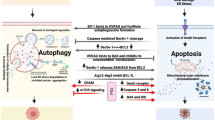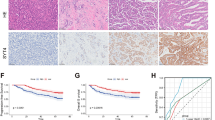Abstract
Background
The heat shock protein 90 (HSP90) plays a crucial role in the stability of several proteins that are essential for cell survival and for malignant transformation. The binding of HSP90 with pro-survival kinase Akt prevents proteosomal degradation of Akt and contributes to the functional stabilization of PI3K/Akt signaling and cell survival. Akt kinase and HSP90 are therefore highly over-expressed in a large panel of cancer cell lines and are present in multi-chaperoning complexes. In this paper, we investigated whether targeting both Akt and HSP90 would inhibit the survival pathway in AGS cells (human gastric mucosal cells), and how Akt/HSP90 inhibition modulates the deoxycholate (DC)-induced apoptosis.
Methods
AGS cells in the presence of Akt inhibitors (LY294002 and wortmannin), or HSP90 inhibitor (geldanamycin, GA) for 30 min or 18 h, respectively, were treated with DC (50 µM). Activation of PI3K/Akt signaling was evaluated by measuring the Akt and PTEN phosphorylation. HSP90, caspase-3 and caspase-9 were detected in whole lysates by Western blot analysis. AGS cells, transiently transfected with Akt siRNA, were treated with DC, and apoptosis was measured by caspase-3 activation. Apoptotic-positive cells were counted according to changes of cell morphology by Hoechst staining and fluorescence microscopy.
Results
The intrinsic level of phospho-Akt (pAkt; active form), phospho-PTEN (pPTEN; inactive enzyme) and HSP90 were highly expressed in AGS cells indicating the active PI3K/Akt/HSP90 signaling. Although, deoxycholate at low concentration (50 µM) slightly inhibited the expression of pAkt and cleaved HSP90 to 55 KDa fragment, no significant effect on apoptosis induction, up to 4 h (as assessed by caspase-3 activation) was observed. The higher concentrations of DC (100 µM-300 µM) resulted in progressive inhibition of pAkt, activation of PTEN, and specific cleavage of HSP90 to approximately 45 KDa fragments with significant induction of apoptosis. Although DC (50 µM) had no profound effect on Akt/HSP90 and did not induce apoptosis, it became an inducer of apoptosis when cells were pretreated with LY294002, wortmannin, or geldanamycin. Consistent with these findings, significant activation of apoptosis in response to DC (50 µM) was observed in cells with depleted Akt protein.
Conclusions
These results demonstrate that down-regulation of PI3K/Akt pathway with specific cleavage of HSP90 to 45 KDa modulates the pro-apoptotic effects of DC in gastric cells. They further indicate the importance of stable Akt/HSP90 complex in regulation of survival/death responses.





Similar content being viewed by others
References
Vivanco I, Sawyers CL. The phosphatidylinositol 3-kinase-Akt pathway in human cancer. Nature Rev Cancer. 2002;2:489–501.
Michl P, Downward J. Mechanism of disease: PI3K/AKT signaling in gastrointestinal cancers. Gastroenterology. 2005;43(10):1133–1139.
Chang F, Lee JT, Navolanic PM, et al. Involvement of PI3/Akt pathway in cell cycle progression, apoptosis and neoplastic transformation: a target for cancer chemotherapy. Leukemia. 2003;17:590–603.
Datta SR, Brunet A, Greenberg ME. Cellular survival: a play in three Akts. Genes Dev. 1999;13:2905–2927.
Bijur GN, Jope RS. Rapid accumulation of Akt in mitochondria following phosphatidylinosil 3-kinase activation. J Neurochem. 2003;87:1427–1435.
Meier L, Alessi DR, Cron P, Andjelkovic M, Hemmings BA. Mitogenic activation, phosphorylation, and nuclear translocation of protein kinase Bβ. J Biol Chem. 1997;272:30491–30497.
Vanhaesebroeck B, Alessi DR. The PI3K-PDK1 connection: more than just a road to PKB. Biochem J. 2000;346:561–576.
Maehama T. PTEN: its deregulation and tumorigenesis. Biol Pharm Bull. 2007;30(9):1624–1627.
Wegele H, Muller L, Buchner J. Hsp70 and Hsp90—a relay team for protein folding. Rev Physiol Biochem Pharmacol. 2004;151:1–44.
Neckers L. HSP90 inhibitor as novel cancer chemotherapeutic agent. Trends Mol Med. 2002;8(4):S55–S61.
Kamal A, Thao L, Sensintaffar J, et al. A high-affinity conformation of HSP90 confers tumor selectivity on HSP90 inhibitors. Nature. 2003;425:407–410.
Isaacs JS, Xu W, Necker L. Heat shock protein 90 as a molecular target for cancer therapeutics. Cancer Cell. 2003;3:213–217.
Redlak MJ, Dennis MS, Miller TA. Apoptosis is a major mechanism of deoxycholate-induced gastric mucosal cell death. Am J Physiol Gastrointest Liver Physiol. 2003;25(5):G870–G879.
Redlak MJ, Power JJ, Miller TA. Protein kinase C involvement in deoxycholate-induced apoptosis in human gastric cells. Dig Dis Sci. 2006;51(5):834–843.
Redlak MJ, Power JJ, Miller TA. Prevention of deoxycholate-induced gastric apoptosis by aspirin: roles of NF-kB and PKC signaling. J Surg Res. 2008;145:66–73.
Bradford HW. A rapid and sensitive method for the quantitation of microgram quantities of protein utilizing the principle of protein-dye binding. Anal Biochem. 1976;72:248–254.
Jeon YK, Park CH, Kim K-Y, et al. The heat-shock protein 90- inhibitor, geldanamycin induces apoptosis cell death in Epstein-Barr virus-positive NK/T-cell lymphoma by Akt down-regulation. J Pathol. 2007;213:170–179.
Chandarlapaty S, Sawai A, Ye Q, et al. SNX2112, a synthetic heat shock protein 90 inhibitor, has potent antitumor activity against HER kinase-dependent cancers. Clin Cancer Res. 2008;14(1):240–248.
Moser C, Lang SA, Stoeltzing O. Heat-shock protein 90 (Hsp90) as a molecular target for therapy of gastrointestinal cancer. Anticancer Res. 2009;29:2031–2042.
Arya R, Malik M, Lakhotia SC. Heat shock genes—integrating cell survival and death. J Biosci. 2007;32:595–610.
Pandey P, Saleh A, Nakazawa A, et al. Negative regulation of cytochrom c-mediated oligomerization of Apaf-1 and activation of procaspase-9 by heat shock protein 90. EMBO J. 2000;19:4310–4322.
Zhao C, Wang E. Heat shock protein 90 suppresses tumor necrosis factor alpha induced apoptosis by preventing the cleavage of Bid in NIH3T3 fibroblasts. Cell Signal. 2004;16:313–321.
Beck R, Varrax J, Gonze T, et al. Hsp90 cleavage by an oxidative stress leads to its client proteins degradation and cancer cell death. Biochem Pharmacol. 2009;77(3):375–383.
Pantano C, Shrivastava P, McElhinney B, Janssen-Heininger Y. Hydrogen peroxide signaling through tumor necrosis factor receptor 1 leads to selective activation of c-Jun N-terminal kinase. J Biol Chem. 2003;278:44091–44096.
Panopoulos A, Harraz M, Engelhardt JF, Zandi E. Iron-mediated H2O2 production as a mechanism for cell type-specific inhibition of tumor necrosis factor alpha-induced but not interleukin-1beta-indiced IkappaB kinase complex/nuclear factor-kappaB activation. J Biol Chem. 2005;280:2912–2923.
Chen H, Xia Y, Fang D, Hawke D, Lu Z. Caspase-10 mediated heat shock protein 90B cleavage promotes UVB irradiation-induced cell apoptosis. Mol Cell Biol. 2009;29(13):3657–3664.
Acknowledgments
These studies were supported by The Jeffress Memorial Trust grant J-878 awarded to Dr. Maria J. Redlak.
Author information
Authors and Affiliations
Corresponding author
Rights and permissions
About this article
Cite this article
Redlak, M.J., Miller, T.A. Targeting PI3K/Akt/HSP90 Signaling Sensitizes Gastric Cancer Cells to Deoxycholate-Induced Apoptosis. Dig Dis Sci 56, 323–329 (2011). https://doi.org/10.1007/s10620-010-1294-2
Received:
Accepted:
Published:
Issue Date:
DOI: https://doi.org/10.1007/s10620-010-1294-2




